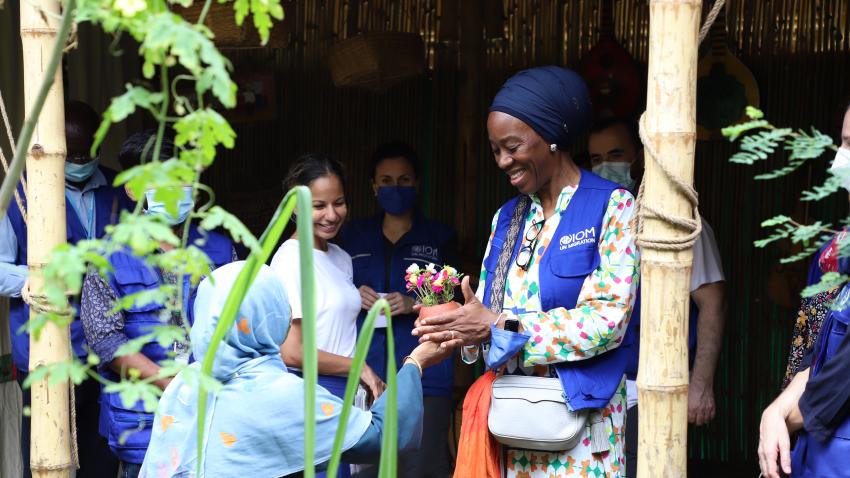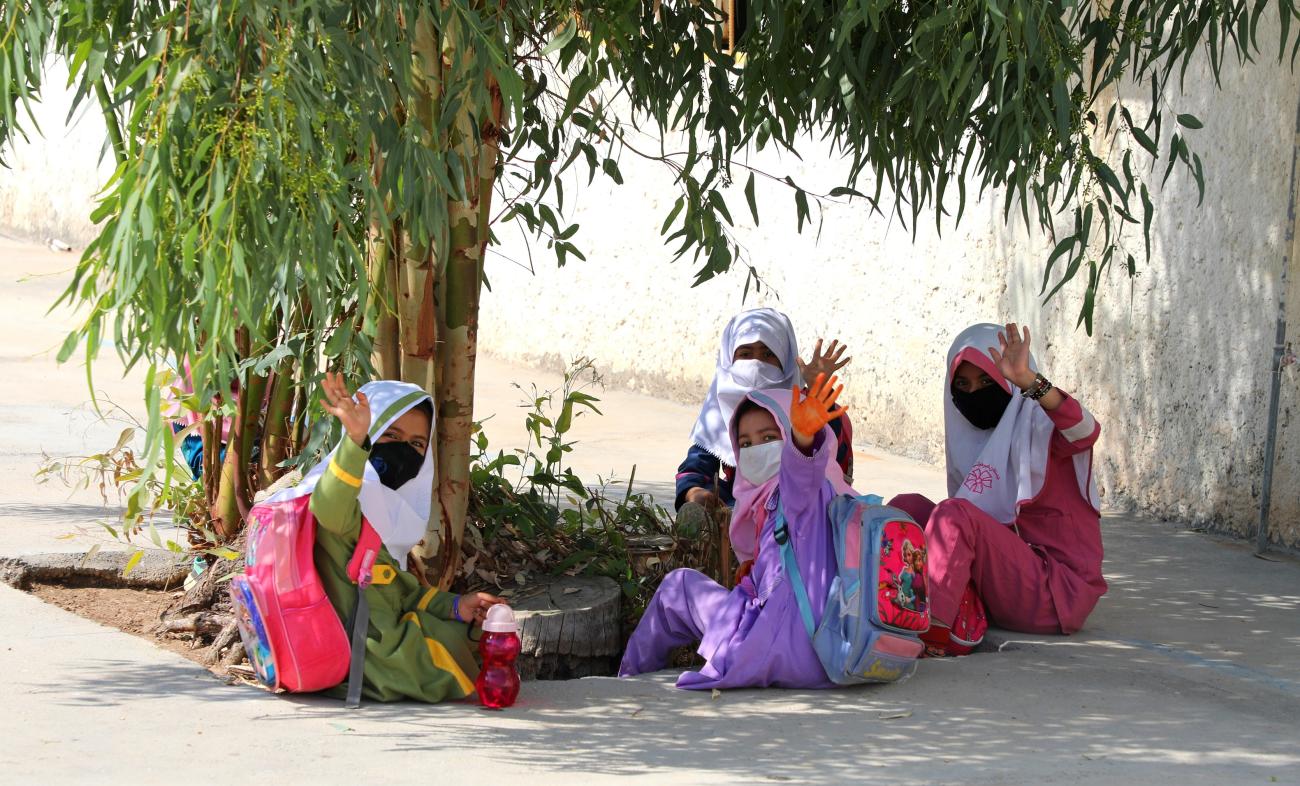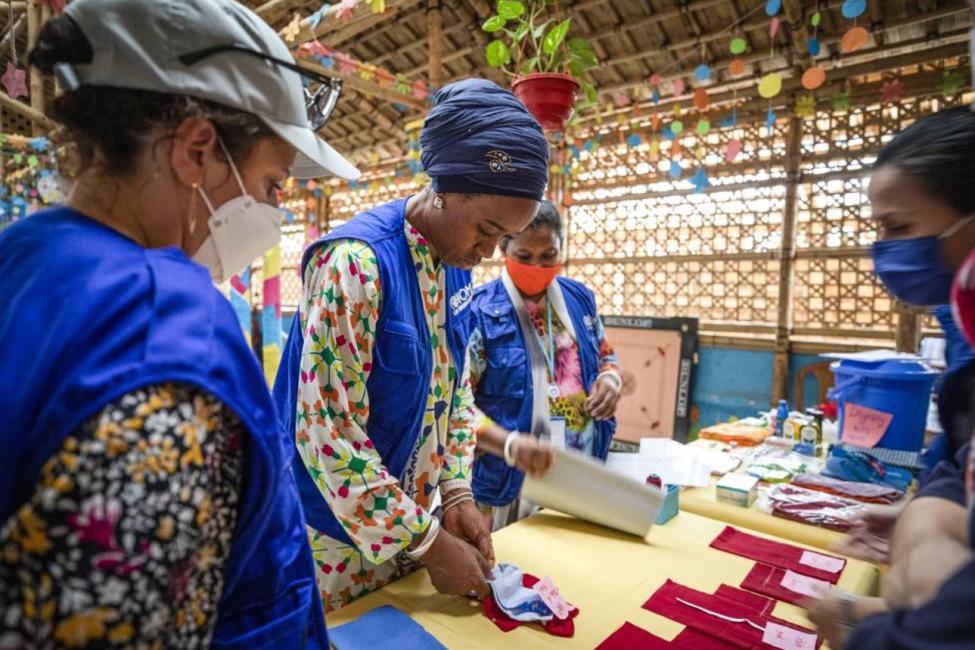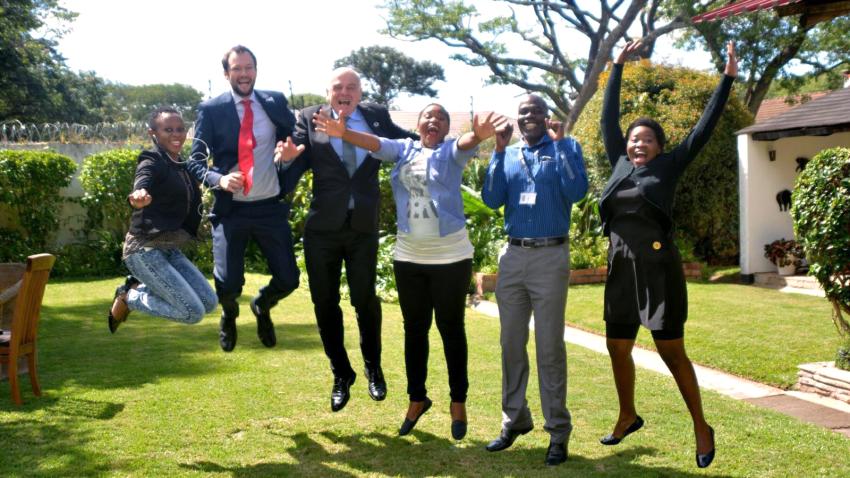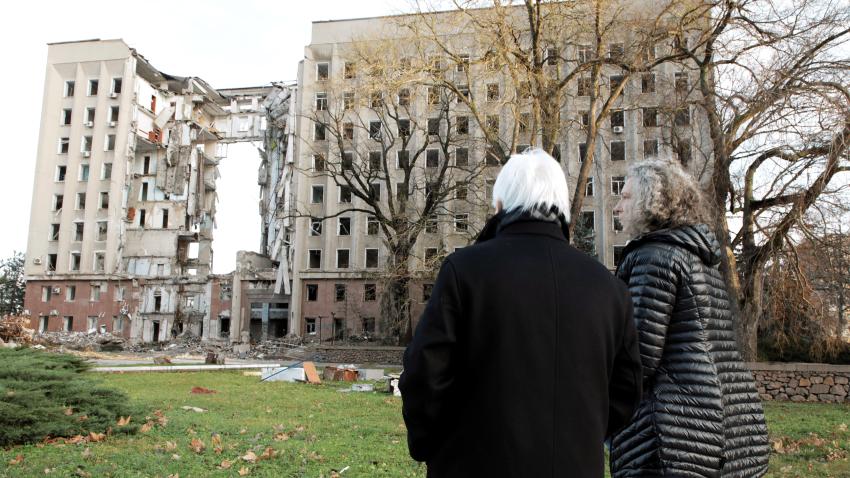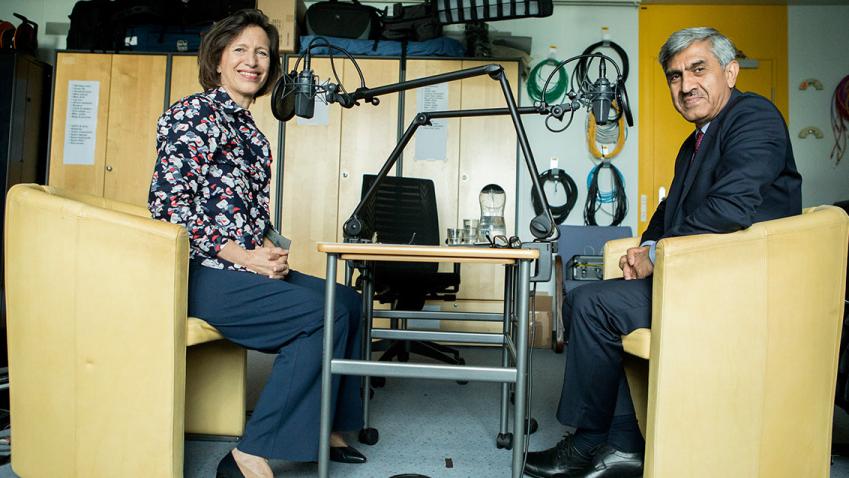“I noticed this woman with a 10-year-old boy. He never looked up, his eyes were down, and he never blinked. And I just kept on thinking, what has this boy seen on his journey here?”
Ugochi Daniels was just six years old when her family fled the civil war in Nigeria. Now the International Organization for Migration’s (IOM) Deputy Director General for Operations, she is often struck by the pain of uprooted children, most recently those escaping from Ukraine.
Women and children are particularly vulnerable when they have left their home – no matter for what reason. Across the world, IOM is dedicated to promoting humane and orderly migration for the benefit of all. In this episode, Ugochi Daniels reflects on efforts to meet the needs of people on the move, and on a life dedicated to the service of others.
Multimedia and Transcript
Ugochi Daniels 00:00
I noticed this woman with a ten-year-old boy, and he wouldn't let his mother move. He was clinging on to her arm and he never looked up. He never looked up. His eyes were down, and he never blinked. And I just kept on thinking, ‘What has this boy seen in his journey here that he's clinging on to his mother this way?’
Melissa Fleming 00:27
From the United Nations. I'm Melissa Fleming. Welcome to Awake at Night. My guest this week is someone who has tirelessly worked to make a difference for people's lives across the world from the Philippines to Iran. Her dedication is something I really admire. Ugochi Daniels has now been appointed as the Deputy Director General of the International Organization for Migration - IOM. I understand you like to be called Ugo.
Ugochi Daniels 01:13
Yes. That’s true.
Melissa Fleming 01:14
Welcome Ugo. That's how everybody knows you. Around the UN, part of the work of the IOM is about helping internally displaced people in conflict and stopping trafficking in human beings. What are the big challenges right now?
Ugochi Daniels 01:32
We are focused on all aspects of what we call human mobility situations that force people to move, or situations that lead people to take a decision to move. And there are two aspects to this movement. It can be safe, dignified, and orderly and regular, or it can be the opposite. Migration is inevitable. In many cases, it's necessary and desirable. So, that's one thing. But then the other part is the flip side. The dark flip side, which is the irregular migration and the situations of vulnerability, and great risk that people find themselves that then force them… Or they end up being smuggled, or trafficked, or sold, which is also a big focus of IOM's work. And my role is really looking at our programmes to support governments, to support partners, to support communities so that they have options to move regularly.
Melissa Fleming 02:52
Many people leave for very compelling reasons - economic increasingly, climate - who are migrants not fleeing war, persecution, but leaving because their situation is untenable. But there aren't always welcoming countries ready to receive them. And they are taking horrific journeys and encountering traffickers. When you think of the situation in Ukraine, we've been hearing that, you know, incredible support for the people having been forced to flee. The millions of people across borders, warm welcomes, open homes. But yet, I believe you have some serious concerns about bad actors who are also exploiting them.
Ugochi Daniels 03:41
Ukraine had one of our biggest counter trafficking programmes before the war. So, we already knew that there was a lot of trafficking activity. And with the impact of the war, major displacement, women and children in very vulnerable situations. We immediately became concerned with the context within which they were moving. And not just the formal transnational crime traffickers, but those who are opportunists, and will use this opportunity to exploit them. And particularly with regard to sexual exploitation, because there were so many unaccompanied minors. And we have hotlines in Ukraine, as well as in the neighbouring countries. And what we saw from the calls we received that 50% of them were about trafficking. How can they move safely?
Melissa Fleming 04:44
Most… Virtually all of those people who are leaving Ukraine are women and children. And so, it must be really, really concerning for IOM. Especially concerning that any of these women could be falling into the wrong hands and desperate to get out. And lots of people opening up their homes or driving up to the borders in cars. I mean, what worries you about this situation?
From the UN on Ukraine:
Ugochi Daniels 05:21
You know, as a mother and thinking about the way I felt, for instance my kids’ first day at school, or kids’ first day in summer camp, and how am I, you know… Just the worry that I had in a normal situation and seeing mothers and their children in the most abnormal of situations. And wanting and being full of fear, but recognizing you are on this journey with your children. You've probably left your partner, your spouse, your parents behind. And so, for me, in my role is that how can IOM support a mother in the situation. And I remember being in... I was in Slovakia at a…They call it a hotspot, but it's a city facility next to the train station. So, they come in, they arrive at the train station, and then they're brought to this facility where they register, etc. And I noticed this woman with a ten-year-old boy. And he wouldn't let his mother move. He was clinging on to her arm and he never looked up. He never looked up. His eyes were down, and he never blinked. And I just kept on thinking, ‘What has this boy seen in his journey here? And how in the role that I do…’ Because it's more than… Of course, you have to, you know, support hot meals and blankets and shelter and all of that. But it has to be more than that. Because for this woman, and with a child in this state, it's like, ‘What's the future for my child? You know, when is he going to come out of the shock of the trauma that he's experienced? And how is that whole process going to happen?’
Melissa Fleming 07:42
Before you joined IOM last year, you were based in Iran as the UN's resident coordinator. You were there as the COVID-19 pandemic began. It must have been a hugely challenging time to be in Iran in general but also during a pandemic. Is there a moment that you can't forget?
Response to COVID-19 in the Islamic Republic of Iran
Ugochi Daniels 08:05
There are many moments. But in particular with the pandemic, because it hit Iran… I think Iran was number two after China. And then the world had no clue. Okay, or had very little clue about what it was dealing with what we… and how to respond. And then we as the UN globally were still figuring everything out. And I remember our first of the country team was like - okay, all dependents everybody, you have to leave, you know, leave the country. But…
Melissa Fleming 08:46
Did you have any family with you there?
Ugochi Daniels 08:47
Yes, I did.
Melissa Fleming 08:48
So, what did you say to them?
Ugochi Daniels 08:49
I said, you have to leave, and my husband said he's not leaving. He absolutely said he's not leaving me in this situation.
Melissa Fleming 08:58
And your children?
Ugochi Daniels 08:59
My children. No. They weren't with me at this time. They should have come but so they just stayed where they were. But what struck me or what weighed upon me, let me put it that way, is the role of leadership and what was expected of me for the team. Because this was like an unchartered waters situation for all of us.
Melissa Fleming 09:33
So, this is March 2020?
Ugochi Daniels 09:35
This is March 2020. You could see the worry and the fear. But also, the fact that everybody was looking to us to provide the way forward and what we were going to do. And I mean, in the end we did the very best that we could. And I think we did all of the right things. But it was the weight of not wanting to let down the team that really even continues to stay with me. But we had to sort ourselves out to be able to focus on what it is that we do as the UN in a country. So, it was the way I felt going into that first meeting, thinking like, ‘I don't know what the heck I'm going to say here.’ But I could see what was expected of me as a leader of a team. And how important that was. And they probably didn't know how much I was shaking inside.
Melissa Fleming 11:02
Were you afraid yourself of getting COVID?
Ugochi Daniels 11:05
Of course, because we didn't know exactly how it was transmitted. So, I remember in those days, wearing gloves, wearing masks, taking off shoes at the door. Anytime you touch something, you wipe it. So, you know, of course I was.
Melissa Fleming 11:26
And what was the situation like in your neighbourhood? What were you seeing around you? And you were in Tehran.
Ugochi Daniels 11:33
At the early stages, it was a bit like, do I say Twilight Zone. It was because people were staying indoors, right? Only going out if they had to. Shops were open for a certain number of hours. So, it was a very weird feeling. And I remember how, you know, people were keeping their distance. And if normally you'd see somebody, you’d say hi. But it was so bad that because at the time we didn't even know if you pass somebody on the street, if you could get COVID that way, you know, in the air. So even just walking was a whole different experience. You step aside and let people go past and you almost like want the air… You wait for new air to pass before you go ahead walking. So, it was really, really strange. The Iranian government moved very quickly in terms of issues around PPE, etc. and all of that. And sanitizers and whatnot.
Melissa Fleming 12:45
What was your role there? And how did it change? Or how were you able to continue to deliver services during the pandemic?
The UN in the Islamic Republic of Iran
In the Islamic Republic of Iran, the United Nations is represented by 20 resident and non-resident agencies, funds and specialized programmes, which carry out activities according to their respective roles and functions. There are approximately 450 staff members in the UN system in Iran (90 per cent of whom are Iranian citizens) and they work in duty stations in different parts of the I.R. of Iran with most based in Tehran.
Ugochi Daniels 12:55
So, the UN team in Iran is not a small team. There are like 20 UN agencies there. Iran, in many ways, is quite forward-leaning in terms of national policies that are in line with international conventions and their commitments. And it's within that banner that a lot of UN agencies are there to support the government in implementing this at a national and local level. And it's quite surprising when you're in Iran, because the international stereotype and the situation in Iran is quite different. There are partners that we can work with, whether it's on, you know, issues of health, issues of education, issues of the criminal justice system for children. Iran is highly conscious of the environment. So, there was a lot of work in terms of modernizing industrial equipment to make sure that it's now more green and more efficient. So, it's a vibrant UN in Iran. But with the shadow of the broader context, obviously, the nuclear deal, the sanctions, the isolation, there's the elected government that we as the UN engage with. But then of course, there's the Islamic regime, which we don't, as the UN… We don't engage with on the daily, you know… They are not our counterparts.
Melissa Fleming 14:37
Indeed, you know, I travelled also when I was at UNHCR to Iran a couple of times. There are lots of contradictions there. They were very, very generous hosts of Afghan refugees. And you couldn't say that for a lot of countries in the world. So, thank you for sharing that. How was it as a woman working in Iran?
Ugochi Daniels 15:00
You know, I get this question all the time. You know, I always say I picked Iran because I wanted a challenge. And I say this to the government. I came to Iran because I wanted to be in Iran, not because there was no other option. And I think the Iranians… Not, I think. I know, the Iranians were very conscious that I was an African woman, and wanted to treat me really, really well. Because they knew a lot of people would be asking me, ‘How could you go to Iran as a woman, as an African?’ But I know it worked in my favour. The government treated me exceptionally well and with great respect.
Melissa Fleming 15:44
Why in particular that you were African? Why would people ask you how could an African…?
Ugochi Daniels 15:50
Because of the assumption of racism. And I did not deal with it at all.
Melissa Fleming 15:58
You had no experience of racism?
Ugochi Daniels 16:00
I had no… Not in Iran. And in fact, people would come up to me in the streets, and they'd say, ‘Where are you from?’ I'd say where I was from. And they would say, ‘Do you like Tehran? Do you like Iran?’ They really wanted me to have a good experience in their country so that when I leave, I share that I had a good experience in Iran.
Melissa Fleming 16:26
So, instead of people maybe in other countries who would judge you by your skin colour, people were actually attracted to come up and speak to you.
Ugochi Daniels 16:35
Yes. It happened all the time. And I remember the first time my husband and I went to the bazaar, we were surrounded. We were surrounded with people within 20 minutes. We must have had 60 to 100 people around us super thrilled that we had come to the bazaar, super thrilled that we were in Iran. But that was a bit much.
Melissa Fleming 17:00
What were they asking you?
Ugochi Daniels 17:02
Where did you come from? Why are you here? Where do you live? What Iranian food do you like? What do you want in the market? And I kind of remember what it was like. I probably was trying to buy vegetables or whatever. And then you now start getting offers of a whole bunch of free things. So, it was really over the top. But of course, I appreciated that they just wanted my husband and I to feel welcome. So, we never had the issues of racism at all.
Melissa Fleming 17:37
It must have been refreshing. Have you felt racism in other contexts and other countries that you have served in?
Ugochi Daniels 17:42
Oh, yes of course. You get it in reactions. And what I always check for is what's the reaction I get when I walk on the street, right? So yes, but not in…
Melissa Fleming 18:00
Where do you experience it the most when you just feel I'm walking down the street and I feel people reacting to my skin colour?
Ugochi Daniels 18:10
It wouldn't be fair of me to say. But, yeah, there have been a couple of experiences like that. And when you go into a shop, and you're treated as if you can't afford anything in the shop. Or when you are like in a line for something and people all move away. Yeah, so I've had that. But I've also had… I remember something really amazing that happened to me when I was in Nepal. And I had… I was on the field visit. There was a colleague from UNICEF, who was with me. I think she was from the regional office, and she was Tanzanian. We went to a school. A group of girls, Dalit girls. And we’re talking and talking and talking. And then the scenario of two African women, obviously, in leadership positions did not cross our mind. And then the girls say to us that they would love to come to Africa, which is not something you often hear. They would love to come to Africa because they're seeing us. And obviously, if you're an African girl, you have a better future than if you're a Dalit girl in Nepal. And that really, really struck me what the impact is of seeing me in the role that I have. That it's extremely powerful for young girls.
Melissa Fleming 20:03
You are from Nigeria?
Ugochi Daniels 20:04
Yes.
Melissa Fleming 20:05
You're from a Roman Catholic family, I believe. How did that shape you in terms of your work?
Ugochi Daniels 20:11
Well, I started working for the UN Population Fund. So, I can just say there were many interesting dinner conversations on sexual reproductive health and rights, and the Catholic Church. Maybe, I'll leave it at that. But what I will say is my parents who are very, very devout Catholics, and they're members of Opus Dei. I was so proud of my father. This particular incident where Opus Dei, in the country where I was living had reached out to Opus Dei in Nigeria to reach out to my dad to get my dad to convince me to stop the work I was doing. Yes. And, for my dad, I mean, Opus… He's devoted his life to this. And he told Opus Dei to leave his daughter alone. And that we are both working - meaning the church and the work that I do – we’re both working to improve the lives of people. We just have different means of doing it. And I was just so, so, so, proud of him because I know what it meant to stand up to Opus Dei. And I knew that the attacks that I was getting from the Catholic Church in the country that I was in at the time were mellowed because of this position my father had taken.
Melissa Fleming 21:54
Was that in the Philippines? I understand that there was quite a controversial birth law in the country at the time that you were working as a representative of UNFPA to try to change. Can you tell me about that?
Ugochi Daniels 22:12
Yes. So, it was the reproductive health law. And it had been in Congress, I think, for 13 years before I came. When I came… And it was serendipity. There was a new president, who was very committed to sexual reproductive health and rights. And so, I felt that if there's ever going to be a time for this law to be passed, it's going to be now. So as UNFPA… That's what I was at the time. We were all in in supporting passage of the law. So, it was when the law was gaining momentum that there was outreach to my dad. So, as I said, super proud of him for taking that position.
Melissa Fleming 23:00
So, it reached from all the way from Nigeria to the Philippines.
Ugochi Daniels 23:03
First from the Philippines.
Melissa Fleming 23:05
Philippines to Nigeria, then back.
Ugochi Daniels 23:06
Yeah.
Melissa Fleming 23:07
And then you were able to carry on your work after that.
Ugochi Daniels 23:11
What eventually happened was this then led to me having a meeting with some cardinals, archbishops, one of which I continued to be… I mean, I would like to say a friend to throughout the time I was in the Philippines. And having not public meetings to continue to explain why the work that we do, and passage of the law was so important for Filipinos.
Melissa Fleming 23:50
Can you just maybe, like try to bring us into the room. Like what would you say what is reproductive health and why the Catholic Church actually should go along with it.
Ugochi Daniels 24:03
So, what it basically boils down to is making sure that women have access to the health care and family planning supplies that they need to control their lives and control their bodies. Fundamentally, that's what it is. And certain parts of the church have a different position. So, let's say in my discussions with the cardinal, I could show that… Not that I could show. The data shows if women do not have access to the health services and family planning supplies that they need, you see an increase in unsafe abortions. You automatically see an increase in deaths. So, we had quite a few discussions. And he did say that I had earned his respect, because in his own words, the lives of Filipinos was in my heart. I mean, he didn't say this publicly or in the newspaper headlines, but at least he said this. I remember when I went to see him at the residence, I'd have to come through the back. Coming through the back means I'm in the kitchen, his private kitchen. And he would make tea because he can't officially be seen with me. So, he would have to be the one making the tea and serving me cookies or cake or whatever. I know, it was a big leap for him. And I was fine with these backdoor kitchen table conversations. Because it meant that communication was happening, and we respected each other.
Melissa Fleming 25:49
What was your childhood like? Where did you grow up? And what did it look like? If you close your eyes, like what comes to mind when you think of your childhood?
Ugochi Daniels 25:59
So, I didn't grow up in Nigeria. I grew up in Sweden, the US and Canada. So I was in Sweden, because my dad was in school there at the time. He was doing his PhD. We came back to Nigeria, but only for a year because then the civil war broke out. And then we had to flee middle of the night, took a boat, the whole shebang. And ended up in the US.
Melissa Fleming 26:30
So, you were actually a refugee?
Ugochi Daniels 26:31
Yeah.
Melissa Fleming 26:32
How old were you?
Ugochi Daniels 26:33
So, I would have been about six years old.
Melissa Fleming 26:37
What do you remember from fleeing?
Ugochi Daniels 26:41
So, what I remember is not understanding why they were pointing guns at my father at the checkpoints as we were fleeing. And as the story goes, because it's my parents that told me this. At one particular checkpoint with the gun to my father's head, and they're asking him what's in the car. So, we're fleeing. The reason why we're fleeing is my dad gets information in the middle of the night that he's on an assassinations list, hit list. And so, they're pointing the gun at his head and saying, ‘What's in the car?’ And I get very annoyed, and I say to this soldier, ‘Stop pointing the gun at my father.’ And this and this is what's in the car. And so, with the innocence of a child, they believe that what's in the car is what I say is in the car. Which is what it was. And then, you know, they lead us through. So, I remember that. I remember so now in the US, and more so in Canada, because I'm older in Canada. I remember a couple of things. So, one is my extended family wasn't there. So, I'd have friends that would be like, ‘Grandma and Grandpa are coming over today.’ All those types of things. And I never had that. I had a lot of questions about why is your hair so curly? Because we were in small… We lived in small university towns, and I go back home, and I'd be like, ‘Mom, why is my hair so curly?’ I didn't really, really understand myself, so to speak. Because Canada, and the US was really all that I knew. I remember being very happy. Being outdoors a lot. My parents are both professors. So, they really wanted me to explore. So, I remember all of that. But I knew I was different. I just couldn't understand why. And then we visit Nigeria. And we go to the village, and we get to the village at night. And there's no electricity. There's no running water. There are lots of mosquitoes. There are wall geckos all over the place. And my brother's running around trying to catch wall geckos. All I remember feeling is I'm home. I just had this sense of… Because like my grandparents are there. My aunts and uncles are there. And I'm like, ‘Yes, I'm home.’ This is what my friends feel like when you have your family. So, I had this grounding. So, I'd had a wonderful upbringing in Canada and the US. And I'm extremely grateful also to Sweden because Sweden was very supportive of Biafrans during the civil war, which is where I come from. So, I'm extremely appreciative of the hospitality that my family had and I didn't want for anything. But going home also gave me a grounding. And I remember the way I felt to this day when I saw lots and lots and lots of people that look like me and my family, the extended family. And I’m like okay.
Melissa Fleming 30:13
Is that what home means to you, maybe?
Ugochi Daniels 30:15
Then it meant to me, not necessarily home, but it meant this is where I come from. These are my roots. And this is not a place where I am different. But now with life in the UN, home just ends up being wherever we spend Christmas as a family.
Solidarity with Rohingya Refugees and Host Communities
IOM Deputy Director General Calls for Solidarity with Rohingya Refugees and Host Communities; Commends Bangladesh's Migration Management and Climate Change Leadership
Melissa Fleming 30:41
What keeps you awake at night these days?
Ugochi Daniels 30:45
So, what keeps me awake at night is how is what I'm doing in the office… Because, you know, when you're in back-to-back-to-back meetings, and you're dealing with processes or coordination structure or procedures and guidelines on whatever. I am saying, ‘Ugo, how is this going to translate for women on the ground, as we say? How is this going to make a difference?’ You say that this is what you've given your life to. Now you're a very senior official. Every day it's about not being an imposter. So that's what keeps me awake. And I know that throughout my career… I mean, I've worked with many people, men and women. But for the women… I know that in this position, there are many women that are looking up to me. And I want to be able to always be somebody that they see that if Ugo could do it, they can do it. Making a difference for women and girls. When I was in Nepal…women's cooperative activity we were supporting. From the cooperative, the women put money aside for their priorities. And I had gone, and I'd spent a long day because the cooperative, the figures, whatever, it wasn't adding up. And I just remember being really frustrated talking about figures. And I didn't know. They were growing mushrooms or whatever. A three-hour discussion. And I'm like, ‘Whoever thought that this is what I would be doing.’ But anyway, at the end, there's one of the women who says she wants to take me… I should come to her house. And she's very persistent. So, I'm like, ‘Okay.’ Anyway, to cut a long story short, she had just bought a new uniform for her daughter, school uniform. And she wanted me to see that with the money from the cooperative this is what she did. And her daughter's going to school in a new uniform. And her daughter who was very skinny came out. Her skirt had swung around her waist. She had to hurriedly put her buttons together, so they weren't matching. And she was kind of like rolling her eyes at her mother. But the beam on her mother's face is something I could immediately connect with. And made everything that I had gone through that day worth it. And the pride this woman had that her daughter was going to school in a new uniform. So that's why I work. And that's why it's not just what keeps me awake at night, but it's what gets me out of bed in the morning with energy and purpose and conviction that I'm going to march through this day with this agenda. And hopefully inspire those I work with to be as equally impassioned.
Melissa Fleming 34:20
Ugo, thank you very much for joining us on Awake at Night.
Ugochi Daniels 34:25
My pleasure. Thank you so much Melissa.
Melissa Fleming 34:29
Thank you for listening to Awake at Night. We'll be back soon with more incredible and inspiring stories from people working to do some good in this world at a time of global crisis.
To find out more about the series and the extraordinary people featured, do visit un.org/awake-at-night. On Twitter, we’re @UN and I'm @melissafleming. Subscribe wherever you get your podcasts and please do take the time to review us. It helps more people find the show.
Thanks to my editor Bethany Bell, to Jen Thomas, Adam Paylor and the team at Purpose and to my colleagues at the UN: Roberta Politi, Katerina Kitidi, Geneva Damayanti, Tulin Battikhi, Bissera Kostova and the team at the UN studio. The original music for this podcast was written and performed by Nadine Shah and produced by Ben Hillier.
I spoke with Congolese refugees who will be soon relocating to Sweden with the help of IOM.
— Ugochi Daniels (@daniels_ugochi) July 31, 2022
Heard heartbreaking stories of trauma followed by amazing resilience.
Our commitment to upholding the dignity and human rights of all remains unwavering. pic.twitter.com/6m2vyZWuLg

